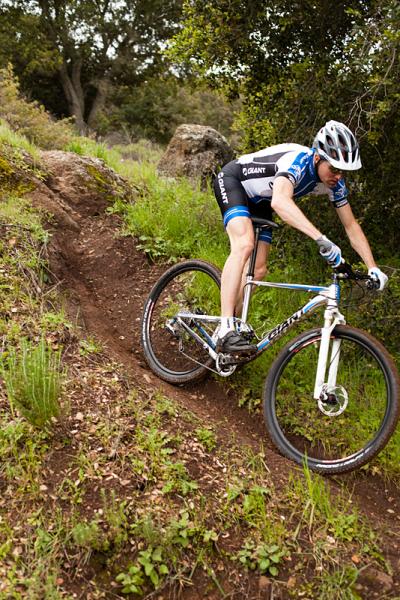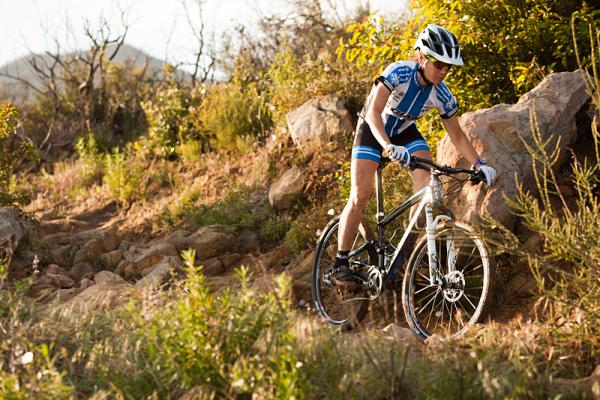Decker and Emmett marvel at mountain biking's evolution
More bikes, more disciplines, more fun?


Carl Decker and Kelli Emmett have seen a lot of changes in mountain biking during their careers. The two Giant Factory Off Road Team riders talked to Cyclingnews at a recent team camp in Santa Barbara, California, about how the sport and its equipment have evolved.
Mountain biking used to be well, just mountain biking. But times have changed. A list of current disciplines includes cross country, downhill, short track, dual slalom, eliminator, freeride, four cross, super D, marathon and other solo or team enduro single day and multi-day events.
"It's all so fractured. It started out that if you were a mountain biker, you were a mountain biker and you used the same bike for everything," said the 35-year-old Decker who began mountain biking in 1984 and is starting his ninth season with the Giant team.
Emmett, 33, got into mountain biking later, during the late 1990s, after a few of today's disciplines had already come into being. She is in her fifth season with the Giant team.
"Before when I first got involved, it was downhill, cross country or dual slalom," said Emmett. "Now you see ultra events, freeride, etc. People think that the interest is mountain biking is not growing, based on what we see at cross country races, where the spectating is minimal, but I think mountain biking is still continuing to grow quite a bit - it's just splintering into different areas.
"It's great that there is not just one standard. At the end of the day, we just want people out riding bikes," said Emmett.
The more and different disciplines have benefited Emmett and Decker. "It's opened up areas like super D, which Carl and I are really into doing. It helps us to specialize in areas for which we are better suited," said Emmett.
The latest race content, interviews, features, reviews and expert buying guides, direct to your inbox!
The down side of so many mountain biking sub-disciplines is the equipment can get a bit overwhelming if trying to be competitive in multiple disciplines.
"Twenty or 30 years later, mountain biking is so specialized that it's like you need a particular bike for doing each trail," said Decker. "Anybody that's a mountain biker now... that could mean six bikes. Ok, maybe it's three, and you can get by with two, but you want six if you have enough garage and enough wallet.
"It's kind of a shame that it takes six bikes but all those bikes are better than the one bike we used to do everything with," said Decker. "Everybody kind of wins. There is so much more choice."
The different disciplines open up mountain biking to riders who are not fitness nuts and who are more into technical, skills-heavy riding. "You can be a fat guy and just do downhill stuff or you can do super D stuff if you're not totally opposed to riding uphill a little bit," said Decker.
"It used to be mountain biking involved a hardtail and you did big loops on gravel roads. Now there is appeal to people who aren't total fitness geeks, which is great. It's a more approachable sport for a lot more people."
Decker thinks the evolution of mountain biking into more different disciplines will only continue.
"It will keep going in that direction. I don't think any of these disciplines are going to disappear any time soon," said Decker, who predicted an increase in one-day endurance events and stage races.
"As far as what gains momentum, Monuments are huge right now like Ironman Worlds ... it's what running marathons was for years. It used to be like 'Oh I don't run, but I think I'm going to do a marathon.' Now big stage races and big one-day monument races like Leadville are the same thing for bicyclists. I don't think that's going to dry up any time soon."
It's easy to get hooked on mountain biking and once you learn, it's easy enough to do solo.
"People get a taste of it. It's hard but it's an attainable goal for those with a modicum of interest or skill in the sport," said Decker. "It's kind of dorky like running a marathon when it takes you six hours or like doing a triathlon that takes all day, but it's an important part of the landscape of cycling. It brings people into the sport and sells a lot of bikes.
"You can just go out your front door," said Decker. "Friends make it better, but you can also have a lot of self-discovery by yourself."
The equipment
One factor increasing the accessibility of mountain biking is the constantly improving equipment.
"It's been a big change from racing rigid bikes," said Decker. "I started racing in '84, and I remember when suspension forks came out and when clipless pedals came out. Those two things were huge.
"Ever since then, well, tubeless tires are the biggest thing. Disc brakes are good, but I'd rather have rim brakes than toe clips. And I'd rather have rim brakes than no suspension. I'd rather have rim brakes than tubes in my tires," said Decker as he prioritized the sport's biggest tech developments.
Even Decker admitted that while he'd like to have six different bikes in his shed to cover all the different kinds of mountain biking he does, technology has come far enough along that riders can get away with one good all around bike for many applications.
"I love having four, five and six-inch [fully suspended] bikes you can pedal uphill and have fun going downhill with," said Emmett.
"It's come full circle. There is an every man's bike now. It's that four, five or six-inch bike that you can ride uphill and do a little of everything on. And it weighs less than those old hardtails I had 20 years ago."
The next generation
A bright spot in the future of mountain biking has been the growth of the sport among high school students. Thanks in part to the National Interscholastic Cycling Association (NICA), leagues are popping up and getting organized around the country.
"I think the high school mountain biking is awesome. I wish I would have found mountain biking younger," said Emmett. "Growing up in Michigan, there was no one who biked. It was only my brother who eventually got into it as I got older."
"Kelli had a late conversion," said Decker. "She was a hard-charging, cigarette smoking, high school party girl."
"Maybe I could have avoided some of that if I'd found cycling earlier?" said Emmett, pondering how her career might have been different.
"Growing up, sports was intimidating. Cycling is something people can do their whole lives as an individual sport. You don't need a team.
"Those high school teams may serve as the gateway through which the next generation of mountain bike pros pass."
Sue George is an editor at Cyclingnews. She coordinates all of the site's mountain bike race coverage and assists with the road, 'cross and track coverage.